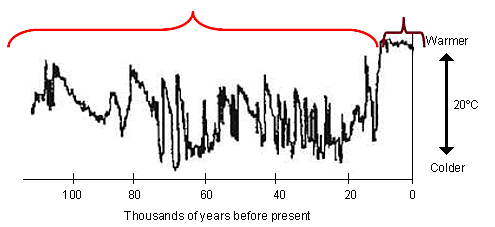Difference between revisions of "12. Climate and its effects"
From SJS Wiki
Rbeniretto (Talk | contribs) |
|||
| (4 intermediate revisions by 3 users not shown) | |||
| Line 1: | Line 1: | ||
Return to [[History 8 Human Origins Concepts]] | Return to [[History 8 Human Origins Concepts]] | ||
| − | + | Climate change was important or early humans because it shaped the way we evolved into what we are today. When the climate changes, we must either adapt to it, or die due to not being versatile enough to live in that environment. Every climate change causes humans to change also, because if they don't, they will most likely die. Climate change also drove early humans all across the globe. When early humans struggled to find food and water in Africa, they migrated into Europe and Asia, because the temperatures were lower there. | |
| − | + | ||
| + | https://www.pig333.com/3tres3_common/art/pig333/3138/what_the_experts_say_3138_climate_change_36158.gif | ||
| − | + | http://www.npr.org/2012/09/17/161278993/what-drove-early-man-across-globe-climate-change | |
| − | + | http://humanorigins.si.edu/research/climate-research/effects | |
| − | + | Manual 31 | |
| − | + | ||
| + | Image: [https://www.pig333.com/3tres3_common/art/pig333/3138/what_the_experts_say_3138_climate_change_36158.gif] | ||
Latest revision as of 20:23, 22 October 2015
Return to History 8 Human Origins Concepts
Climate change was important or early humans because it shaped the way we evolved into what we are today. When the climate changes, we must either adapt to it, or die due to not being versatile enough to live in that environment. Every climate change causes humans to change also, because if they don't, they will most likely die. Climate change also drove early humans all across the globe. When early humans struggled to find food and water in Africa, they migrated into Europe and Asia, because the temperatures were lower there.

http://www.npr.org/2012/09/17/161278993/what-drove-early-man-across-globe-climate-change
http://humanorigins.si.edu/research/climate-research/effects
Manual 31
Image: [1]